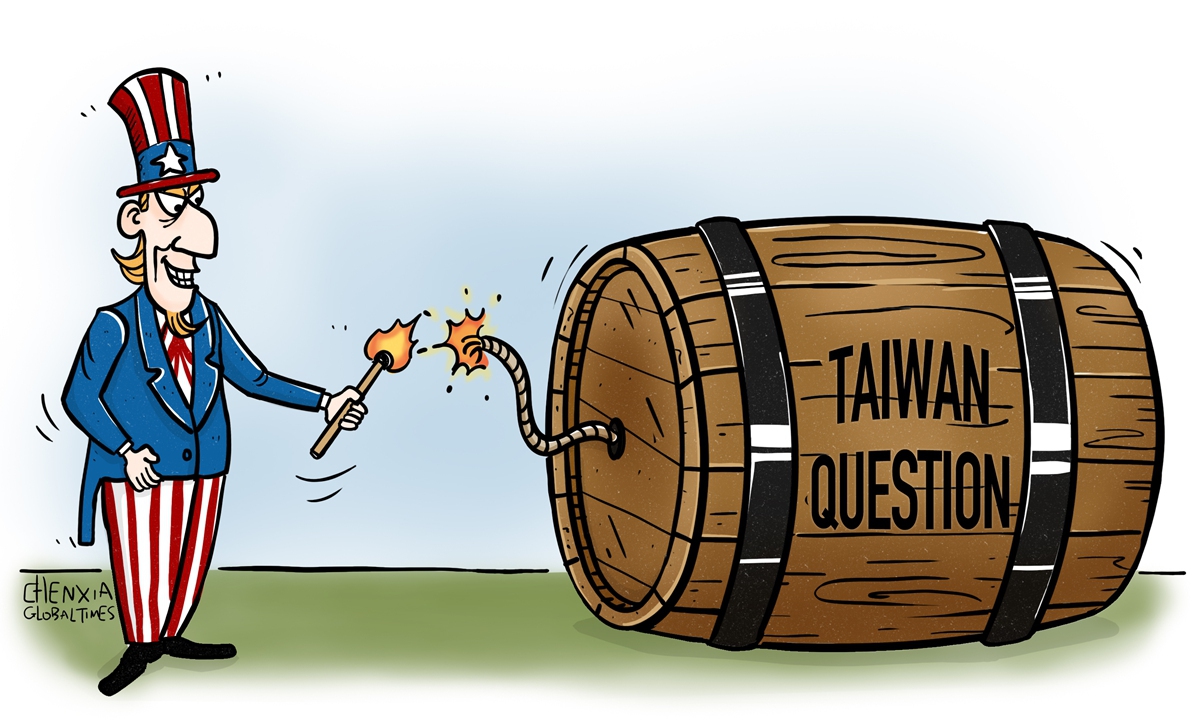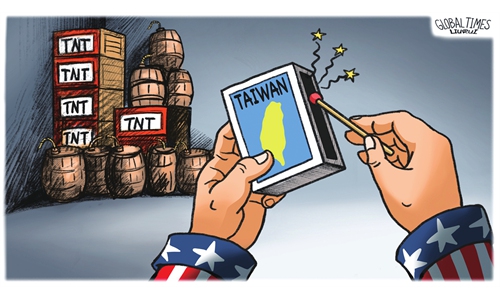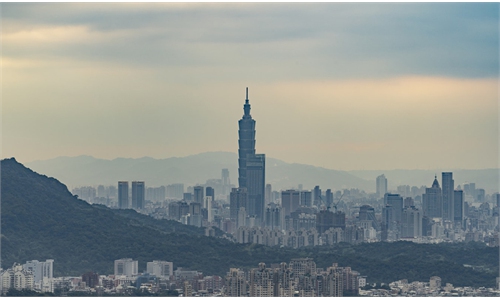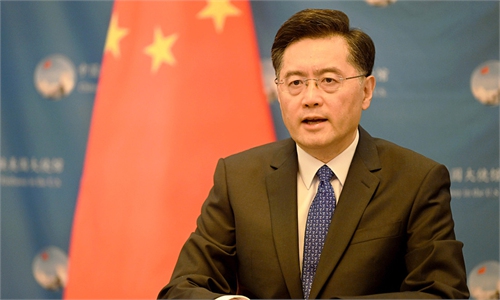
Taiwan question Illustration: Chen Xia/GT
The window of opportunity to avert a war between the US and China over Taiwan island is closing. While there is still time, it is critical for Americans to understand the cost and futility of the US China containment strategy. This could enable citizens to push back on the irresponsible war mongering of political and defense industry elites.Information available in open-source literature reveals that America's volunteer military is at grave risk from a flawed strategy. The US Navy and Marine Corps team will play the pivotal military role in the approaching conflict. Their respective doctrines are titled Distributed Maritime Operations (DMO) and Expeditionary Advanced Base Operations (EABO). Each confidently presumes that naval forces can conceal from and deceive the Chinese as to the strength, locations, and missions of ships and small units in and near the 1st Island Chain. They also imagine safely maneuvering out of harm's way following detection.
Theater-wide concealment requires emissions control across the electromagnetic spectrum (EMS) 24/7, and all ruses must be credible. However, the US underestimates China's integrated terrestrial and marine, intelligence, surveillance, and reconnaissance (ISR) network. China also operates many advanced space surveillance platforms and possesses many high resolution commercial imagery systems licenses. China's quantum computing capabilities overmatch those of the US. China will be able to crack US secure communications and mash EMS and cyber data with that collected from its regional ISR network in real-time. Since deception is critical for DMO and EABO to succeed, US efforts to mislead will be readily transparent.
US Tomahawk, Naval Strike and Harpoon Missiles are subsonic, while China has fielded a family of precision hypersonic missiles, including ones capable of Infrared homing.
Immediately following a US launch, the Chinese will know the point of launch and the type of missile fired through plume spectral analysis. If the Chinese counter-fire on detection, at Mach 3-5+ their missiles will reach a US launch point in or near the 1st Island Chain before the US missile hits its land or sea target. At a minimum, the EABO-shoot-and scoot technique to evade counterfire is unrealistic.
The South and East China Seas and the Taiwan Straits have been China's marine near-frontier since antiquity. Similarly, Taiwan island, the 1st Island Chain, and the Xisha Islands, Huangyan Island and Nansha Islands have formed China's terrestrial backyard. Every stretch of navigable seas and militarily useful piece of island terrain have been surveyed and mapped.
Cooperation of US allies is not guaranteed. For example, the Republic of the Philippines (RP) does not want to become a Chinese satellite, but it wants even less to become a proxy nuclear battlefield. The RP has tolerated US communications, logistics, and ammo storage facilities on its territory. But when RP officials suspected the US might be storing nuclear weapons, the cooperation almost ceased. If the US now plans to establish expeditionary bases that host Tomahawks, which happen to be capable of being armed with nuclear warheads, the RP's and
China's suspicions will become acute. In war China will accept high casualties to counter any existential threat to its territorial integrity and sovereignty. In the case of Taiwan island, the US will not. The island's fate is not a core US national security priority. In addition to the quality of China's peer military, its command economy permits mass weapons and munitions production to a degree the US model cannot justify for what constitutes an optional foreign expedition. Finally, China will exploit its mass and internal lines advantages, as well as the US' geographic disadvantages, to maximize its historically successful penchant for surprise.
The carnage inflicted on faithful Marines and Sailors aboard ships and expeditionary bases will only serve as a tripwire to enrage the US public and inevitably escalate the conflict to the previously unthinkable brink of nuclear confrontation.
Taiwan island will always mean more to China than the US. Regardless of how violently the conflict plays out, China's emotionally fueled psychological overmatch portends certain defeat and withdrawal of US forces intending to contain China. Our defeat will not be due to any comparative material advantages, but rather to the US' unwillingness to endure high losses when the cause was never existential to America's survival.
Instead, the US can provide better service by respecting China's sovereign imperatives and jointly pursuing regional stability. The future of the Indo-Pacific should not be based on national hubris or parochialism, but rather by the common good.
The author is a retired Marine Corps infantry officer and a former Pentagon employee. Opinions are of the author and do not represent the US government. opinion@globaltimes.com.cn



